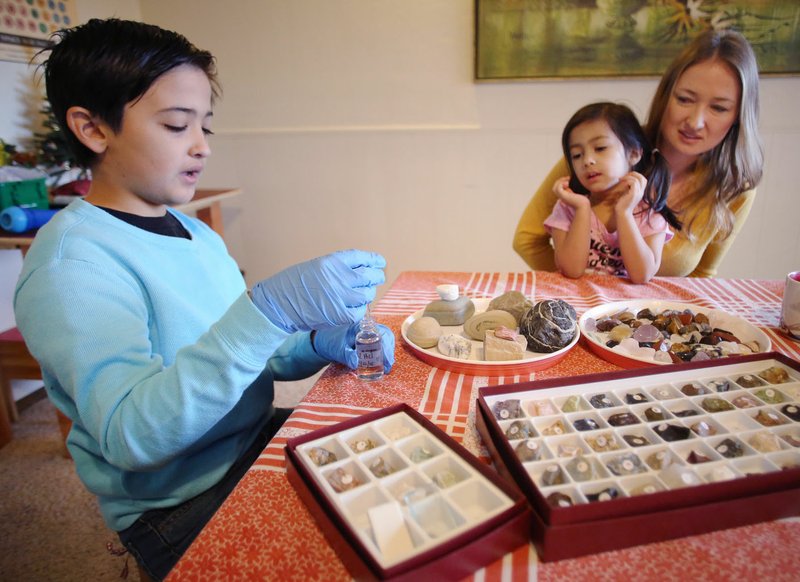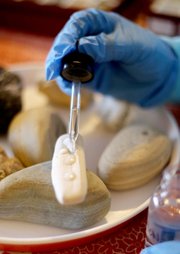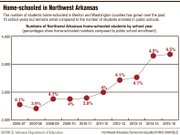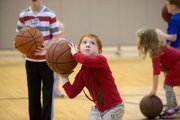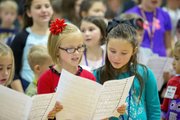Editor’s note: This region is experiencing a large increase in the types of schools and learning approaches available. The Northwest Arkansas Democrat-Gazette explores those different options and their impact on the education landscape in a seven-part series that began Sunday.
Web watch
See a video of the local home school group, this and the previous stories in the series at nwaonline.com
Interested in home schooling your child? Here are four rules to know:
• Parents are required to complete a notice of intent to homeschool and waiver forms before each school year and submit them to the superintendent of their school district.
• There are no educational requirements for parents who home school.
• It is the responsibility of parents to locate and buy all books, curriculum and materials. What they choose to buy is up to them.
• Under Act 832 of 2015, the state of Arkansas no longer requires home-schooled students to take standardized tests taken by public school students.
Source: Arkansas Department
of Education
Patrese Hudgins was a stay-at-home mother actively engaged in her son’s elementary school in Rogers. She was parent teacher organization president. She helped out in the office. She chaperoned field trips.
“I gave a lot to the school so I could be around my son all the time,” Hudgins said.
Then she started thinking: How much better off would her son be if she devoted her time strictly to him instead of the school? With her husband’s encouragement, Hudgins began home schooling her son, Louis, after the second grade. Louis, 10, is now in his third year of being home-schooled.
“I can give him the individual attention he needs on things he might struggle with, but he can also advance in other areas instead of sitting around the classroom being bored when they’re having to cater to someone else who is struggling in that certain subject or area,” she said.
Despite expansion in the educational options available across Northwest Arkansas, a rapidly growing number of families in the area are choosing to educate their children at home. The trend mirrors what’s happening nationally.
The number of homeschooled students in the United States more than doubled from 850,000 in 1999 to about 1.8 million in 2012, according to a report released last month by the National Center for Education Statistics. Most home-schooled students were white (83 percent) and not poor (89 percent) as of 2012. Students were considered poor if they were living in households with incomes below the poverty threshold.
Arkansas’ number of home-schooled grew at a more modest 56 percent during the same time frame, from 11,038 to 17,215, according to Arkansas Department of Education data.
Parents who choose to home school their children must submit forms notifying their local school districts of their intentions. School districts in turn must submit those forms to the state Department of Education.
The number had grown to 19,229 — equivalent to 4 percent of students enrolled in the state’s public schools — in the 2015-2016 school year. If home-schooled students were part of one district, that district would be the third largest in the state.
FINDING EACH OTHER
Benton County is home to more home-schooled students than any county in the state — 2,323 in the county’s seven school districts as of last year. The number is about 5.7 percent of those enrolled in the county’s public schools.
Pulaski County had the second-highest total of homeschooled students at 2,072. Washington County was third at 1,353.
The number of homeschooled students in Benton and Washington counties grew 32 percent between the 2006-07 and 2015-16 school years. Enrollment in the area’s public schools — including charter schools — grew 23 percent during the same time frame.
Cassie Smith, a Bella Vista mother of two, started home schooling her 11-year-old son about three years ago. Looking for a way to meet up with other home-schoolers, she posted on Facebook she’d be having a park play date in Bella Vista. One person showed up.
“And I was like, well that’s a flop,” she said.
But the next time she did it, more than 50 people showed up. The group she started developed into what’s now called the Social Homeschoolers Network of Northwest Arkansas. In less than three years, membership has grown to more than 100 families and nearly 400 students.
The g roup organizes weekly field trips and other activities. On a November afternoon at the Bentonville Church of Christ activities center, about 100 children practiced singing Christmas carols under the direction of a professional musician.
“We have different speakers come in, like Carroll Electric coming in and teaching about electricity, or Arkansas Game and Fish teaching about fish,” Smith said. “Then we also do tons of play dates. So we have about two to three events per week, mainly geared toward the kids socializing and getting to know each other.”
S o m e l o c a l m u s e - ums and libraries cater to home-schoolers with special programs. The Crystal Bridges Museum of American Art in Bentonville, for example, has programs specifically for home-schooled children. The Scott Family Amazeum next door periodically offers Homeschool Days.
“We’re for all learners at all stages, regardless of the format they choose to do that in,” said Dana Engelbert, Amazeum’s marketing manager.
Jessica Rowe, a Springdale mother of three children enrolled in the network, said she couldn’t imagine home schooling without the group.
“There are things we miss about public schools — the things that were the most fun, like class parties,” she said. “And this group does that. It’s just really filled the need.”
Rowe said she began home schooling after her daughter — then a second-grader — expressed disinterest in a math lesson Rowe tried to give her one day. It was a sudden change for a girl who previously had shown great interest in learning.
“She said, ‘Can we not do this?’ And I was like, why? And she said, ‘Because every time we get to a new subject in school, I’m bored because I already know it,’” Rowe said.
OUTSIDE VIEWS
Out of the 15 school districts in Benton and Washington counties, Gravette stands out the most for its home-schooled population. Last year Gravette had 174 home-schooled children, equal to 9.6 percent of the School District’s enrollment — the highest percentage in the region. Siloam Springs was second at 8 percent.
Gravette’s home-schooled number increased 41 percent between 2010 and 2015. School District Superintendent Richard Page is aware of the numbers, but is not certain what’s driving the trend.
“There’s a lot of things causing kids to go in a different direction,” Page said.
There’s no certainty either about what kind of education those students are getting at home.
“In order to go to home school, you just need to file the paperwork. There’s not any real accountability to that as far as making sure that they do. So the process leaves some things to be desired as far as making sure homeschooled students are actually being home-schooled,” Page said.
State politicians have tried to provide a friendlier environment for home-schooled children.
The Legislature in 2013 passed a law requiring traditional public schools to offer home-schooled students the chance to participate in any of their interscholastic activities, such as an athletic team, band, choir or debate.
Jody Wiggins, assistant superintendent of the Siloam Springs district, said Siloam Springs is a conservative community with a strong Christian home schooling association, two reasons there are so many home-schooled children in the district.
He noted, however, “quite a few” of those children return to the public school at the middle or high school level, often because of the types of classes or extracurricular activities offered.
Wiggins believes the vast majority of home-schooling parents are doing it for the right reasons and educating their children in the way they see appropriate.
“Do I think there are exceptions? Yes, I think so, and possibly there are kids slipping through cracks,” he said. “But the vast majority of the ones from our district are doing it right. A lot of them come back to us at the high school level, at least for a class or two, and for the most part they come back very well prepared.”
Data provided by the state show Arkansas’ home schooled students consistently outperform their public school counterparts on standardized math and literacy tests for third- through ninth-graders. In 2014, for example, the typical homeschooled student scored in the 60th percentile of students on those tests. They did better on reading than on math, but were better than average in both subjects.
Act 832 of 2015 repealed t h e re q u i re m e n t h o m e schooled children participate in the state’s standardized testing.
Arkansas has had 984 National Merit semifinalists named since 2010; 49 of them, or 5 percent, were classified as home schooled students, according to the National Merit Scholarship Corp. It’s unclear how many years those students were homeschooled.
Home schooled students taking the ACT college entrance exam consistently outperform the national average, according to a yearly analysis by ACT.
Nationally, the average composite score among the 15,225 students from the class of 2016 who identified as home-schooled was 22.9; the overall average among more than 2 million taking the ACT was 20.8. The best possible score is 36.
MANY MOTIVATIONS
Survey results from the National Center for Education Statistics showed nine in 10 home-schooled students’ parents reported concern about school environments — such as safety, drugs or peer pressure — was an important reason for their decision to home school.
A desire to provide religious or moral instruction also ranked high.
Smith said she believes religious and political views are probably the main reasons parents pull their kids out of public schools.
“Some do it because they want to have more of a Christian curriculum. They don’t necessarily believe in what the public school system is teaching,” she said.
“Some of them do it for medical issues. We have a lot of kids with disabilities that don’t fit into the regular public school scene, or they struggle. We have some that are such advanced learners that they should be way past where they’re at in public school, but they’re being held back with the rest of their class,” Smith said.
Sherrie Mitchell of Springdale and her two children, ages 17 and 9, belong to Smith’s group. Mitchell’s older child was in public schools until he was 13. The family decided to transition to home schooling in part because of a medical issue the older child had.
“But mainly, it’s nice to have the flexibility to choose how we learn, what we learn, and who we do it with,” Mitchell said. “And it’s really brought our family closer together, and I feel like my children have flourished.”
Jennifer Schwammlein of Fayetteville home schools her three children, ages 13, 11 and 6. Schwammlein, a former third grade teacher in both public and private schools, said her interest in home schooling stems from a philosophy that education shouldn’t be confined to a certain part of the day.
“Learning is happening all around us and it can happen by reading a book, by playing a piano, by exploring nature,” she said.
Schwammlein said many families will continue to home school regardless of the other education options that surface, because what those families are looking for is “pretty different.” Still, her 13-year-old son is considering the public school option for when he begins high school next year.
“Home schooling may be good for a particular season, then your season changes,” she said. “So that’s where we’ve landed, in saying this has been fantastic for the younger years of education, for a variety of reasons, and now for the older years it would be nice to have something more structured. But not every family would say that.”
The rise of online education has in some ways created a more hospitable environment for home schooling.
Schwammlein said she has friends who have participated in the Fayetteville Virtual Academy, a charter school for grades four through eight run by the Fayetteville School District. Virtual schools “can provide a step into home school- ing, because some people feel overwhelmed not knowing where to begin,” she said.
Arkansas’ public online schooling sector has expanded in recent years. Two open enrollment charter schools that are strictly online — Arkansas Virtual Academy and Arkansas Connections Academy — serve about 2,500 students statewide and about 320 students in Benton and Washington counties.
Nearly 400 students attend Arkansas Connections Academy. About 18 percent of them identified home schooling as their prior schooling situation, according to Gaby Rodriguez, a school spokeswoman.
HIGHER VIEW
Don Crandall, vice president for enrollment at John Brown University in Siloam Springs, said about 10 percent of the university’s students have a home schooling background. He’s seen that percentage rise substantially since he started the job 31 years ago, he said.
Home-schooled students generally are well prepared for college-level work and are even a little stronger than the average student when it comes to time management skills, Crandall said.
“Usually you wouldn’t know, if you’re in the classroom teaching a student, whether they’re from a large public high school or have been home-schooled,” Crandall said.
Home-schooled students seem to do well not only in qualifying for admission, but also in competing for academic scholarships, he said.
At the University of Arkansas at Fayetteville, on a campus of about 27,000 students, fewer than 1 percent were home-schooled, according to Suzanne McCrary, vice provost for enrollment and the dean of admissions.
Home-schooled students probably lean more toward smaller colleges and universities because they’re used to the small-school environment, McCrary said.
Data suggest the homeschooled students who do attend the University of Arkansas are doing well. Forty percent of them finish their first semester with a grade point average of 3.5 or better. Only 31 percent of the other students do the same, Mc-Crary said.
Home-schooled students also come to the university with more college credit already under their belt, an average of seven credit hours compared to four credit hours for the average not homeschooled student, she said.
Dave Perozek can be reached at [email protected] or on Twitter @NWADaveP.

